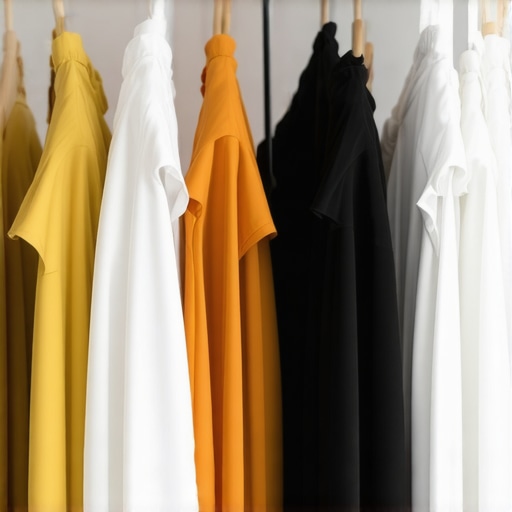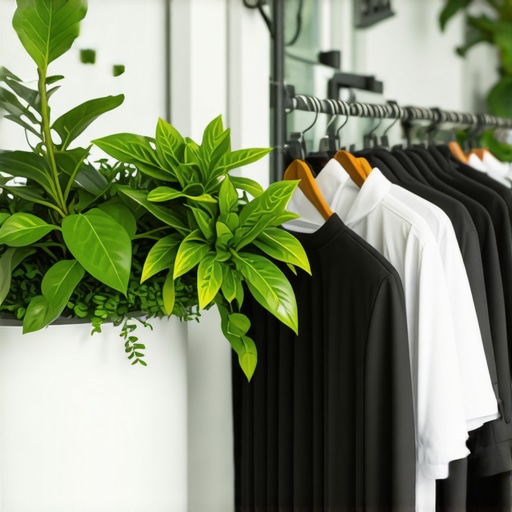Discovering the Gentle Art of Eco-Friendly Dry Cleaning in Tampa
As someone with sensitive skin and a passion for sustainable living, I’ve always been cautious about how my clothes are cleaned. My journey toward finding the best green and chemical-free dry cleaning service in Tampa started quite unexpectedly. I remember the day I spilled red wine on my favorite silk blouse—an heirloom piece that I couldn’t bear to see damaged by harsh chemicals. That moment sparked my quest for safer, eco-friendly fabric care.
Why I Switched to Chemical-Free Dry Cleaning for Delicate Fabrics
After researching, I learned that traditional dry cleaning often involves Perc (perchloroethylene), a solvent linked to health and environmental concerns. I was determined to find a solution that protected my sensitive skin and the planet. I discovered that many local eco-friendly dry cleaners now use plant-based solvents and innovative techniques that are gentler and safer. These options not only preserve the integrity of delicate fabrics but also align with my values of reducing chemical exposure.
My Experience with Plant-Based Cleaning Solutions
One of the most eye-opening aspects of my journey was exploring plant-based cleaning solvents. These natural solutions effectively remove stains without the harsh chemicals, making them ideal for sensitive skin and fragile textiles like silk, wool, and cashmere. I’ve noticed that clothes cleaned with these methods feel softer, smell fresher, and last longer—an incredible benefit for my high-end wardrobe.
How Do I Know It’s Truly Eco-Friendly?
That’s a great question! I always look for certifications and transparency from my dry cleaner. Many reputable eco-friendly services share their cleaning processes and use eco-labels to guarantee environmentally safe practices. For example, some Tampa-based cleaners are certified by organizations dedicated to green standards, ensuring they meet high sustainability criteria. Trust is essential when entrusting your clothes to someone else, especially when sensitive skin is involved.
Could Eco Dry Cleaning Be the Future of Fabric Care?
Absolutely! As more consumers become aware of the health and environmental impacts of traditional cleaning methods, green dry cleaning is gaining momentum. According to industry experts, eco-friendly practices not only benefit our health but also extend the lifespan of garments, saving money and reducing waste.
What Are the Key Benefits of Choosing Non-Toxic, Chemical-Free Dry Cleaning?
Choosing non-toxic options means fewer allergens, less chemical residue, and a healthier environment for everyone. For those like me with sensitive skin or allergies, this decision can significantly improve daily comfort. Plus, it’s a meaningful way to support local businesses committed to sustainability and ethical practices.
If you’re curious about making the switch or want to share your own experiences, I invite you to leave a comment below. Let’s champion a cleaner, safer way to care for our clothes and our planet!
Innovating with Eco-Conscious Techniques in Tampa’s Textile Industry
As the demand for sustainable fashion grows, so does the need for environmentally responsible cleaning methods. Tampa’s eco-friendly dry cleaning services are pioneering innovative solutions, including the use of plant-based solvents and biodegradable detergents, that safeguard delicate fabrics while protecting our planet. These advancements not only cater to eco-conscious consumers but also set new industry standards for chemical safety and sustainability.
What Makes Plant-Based Dry Cleaning Solutions a Game-Changer?
Plant-based cleaning solutions, such as those highlighted in this comprehensive guide, are revolutionizing fabric care. They effectively remove stains and odors without the use of hazardous chemicals like Perc, offering a safer alternative for sensitive skin and delicate textiles like silk and cashmere. These solutions are not only eco-friendly but also preserve the integrity of high-end garments, extending their lifespan and maintaining their original appearance.
How Does Certification Enhance Trust in Eco-Friendly Dry Cleaners?
Certification from recognized environmental standards organizations ensures that Tampa-based dry cleaners adhere to strict eco-friendly protocols. Certifications such as Green Seal or EcoLogo demonstrate a commitment to using non-toxic, biodegradable solvents and sustainable practices. For consumers prioritizing health and environmental impact, choosing certified providers—like those reviewed in this resource—provides peace of mind and assurance of quality.
Can Eco-Friendly Dry Cleaning Preserve and Extend Garment Lifespan?
Absolutely. Industry experts emphasize that gentle, chemical-free cleaning methods reduce fabric wear and tear, thereby prolonging the life of your wardrobe. Regular use of eco-friendly practices prevents the breakdown of fibers, especially in delicate and luxury garments, allowing you to enjoy your clothes longer while minimizing waste. Discover more about sustainable garment care strategies in this insightful article.
What Are the Practical Steps to Transition to Eco-Friendly Garment Care?
Transitioning involves selecting certified, plant-based cleaners, understanding fabric-specific care instructions, and maintaining proper storage to prevent damage. Additionally, advocating for eco-friendly practices within your community or workplace can foster wider adoption. For instance, encouraging local dry cleaners to adopt green certification or offering tips on eco-safe laundry routines can make a significant difference. If you’re interested in learning how to identify truly green dry cleaning providers, visit this guide for practical advice.
If you’re inspired to support Tampa’s green fabric care movement, share your experiences or questions in the comments below. Your insights can help others embrace a safer, more sustainable approach to wardrobe maintenance!
As I continue my journey exploring eco-friendly dry cleaning options in Tampa, I realize that each experience uncovers new layers of understanding about sustainable fabric care. One aspect that often goes unnoticed is the intricate balance between technological innovation and the preservation of delicate textiles. For instance, while plant-based solvents are revolutionary, they demand precise application techniques to achieve optimal stain removal without compromising fabric integrity. This nuanced approach reminds me of the importance of ongoing education and collaboration among industry professionals to refine these methods continually.
Reflecting on my personal encounters, I’ve observed that the true challenge lies in bridging the gap between eco-conscious practices and consumer awareness. Many local dry cleaners are adopting green certifications, such as these standards, but not all customers recognize their significance. Educating consumers about what these certifications entail and how they translate into healthier, longer-lasting garments is essential. I’ve found that sharing detailed stories about my own experiences—like how my silk blouses maintained their luster after switching to plant-based cleaning—helps foster trust and encourages others to seek out certified providers.
Moreover, the ethical dimension of eco-friendly dry cleaning extends beyond chemicals. It encompasses fair labor practices, local economic support, and transparency in sourcing materials. In Tampa, innovative services are emerging that embrace this holistic approach, integrating eco-friendly solvents with ethical business models. For example, some businesses are transparent about their sourcing of biodegradable detergents and employ local artisans to develop sustainable packaging solutions, creating a ripple effect that benefits the community and the environment alike.
One sophisticated question I often ponder is: How can we, as consumers and industry stakeholders, accelerate the adoption of truly sustainable practices without compromising quality or affordability? Industry reports, like the one from this comprehensive guide, suggest that technological advancements, combined with consumer advocacy, can lead to broader market shifts. For instance, incentivizing green certifications or offering educational campaigns can motivate more dry cleaners to transition. Personally, I believe that fostering a community dialogue—through social media, workshops, or local events—can empower consumers to demand higher standards and support eco-friendly businesses.
If you’re passionate about making a difference, I encourage you to share your experiences or questions below. Your insights can inspire others to embrace sustainable fabric care and help shape a future where eco-friendly dry cleaning is the norm, not the exception.
< >
>
Innovating with Eco-Conscious Techniques for Delicate Textiles in Tampa
As my journey deepened into the realm of eco-friendly dry cleaning, I encountered sophisticated techniques that transcend basic green practices. The integration of ultrasound-assisted cleaning, for instance, exemplifies how technology can delicately remove stains from sensitive fabrics like silk and cashmere without compromising their integrity. This method employs high-frequency sound waves to dislodge dirt particles, offering a non-invasive alternative that aligns with my commitment to sustainability and fabric preservation. Such innovations are not just theoretical; reputable Tampa-based eco-friendly dry cleaners are beginning to adopt these cutting-edge solutions, setting a new standard for environmentally conscious garment care.
What Role Do Certifications Play in Ensuring Authentic Eco-Friendly Practices?
Certifications like Green Seal or EcoLogo serve as vital indicators of a dry cleaner’s dedication to genuine sustainability. They ensure that companies adhere to rigorous standards, including the use of biodegradable solvents, waste reduction, and ethical sourcing. In my experience, selecting a certified provider—such as those highlighted in this resource—provides peace of mind that your garments are treated with integrity and that environmental impact is minimized. These certifications foster transparency and trust, which are crucial when entrusting delicate, high-value pieces to professionals committed to ecological responsibility.
How Can Industry Collaboration Accelerate the Shift Toward Sustainable Garment Care?
Industry collaboration is a potent catalyst for widespread adoption of eco-friendly practices. Initiatives that bring together dry cleaners, fabric manufacturers, and environmental organizations can foster innovation, share best practices, and develop standardized protocols. For instance, collaborative research into new plant-based solvents or biodegradable packaging can significantly advance sustainable fabric care. Personally, I advocate for local industry forums and workshops—like those organized by Tampa’s green business alliances—that promote knowledge exchange and collective action. Such synergy not only accelerates technological progress but also amplifies consumer awareness, creating a ripple effect that benefits both the environment and the local economy.

Beyond technological and certification advancements, the ethical dimension of eco-friendly dry cleaning warrants attention. Transparency about sourcing, fair labor practices, and community engagement are integral to truly sustainable operations. Some Tampa-based services are pioneering models that integrate eco-conscious solvents with fair-trade sourcing and local employment, exemplifying a holistic approach to sustainability. These practices resonate with my belief that environmental responsibility must extend beyond chemical use to encompass social equity and ethical integrity, thereby fostering a more resilient and conscientious textile industry.
How Can Consumers Play a More Active Role in Promoting Eco-Friendly Garment Care?
Consumers possess significant influence through informed choices and advocacy. Educating oneself about certifications, fabric-specific care, and the benefits of non-toxic solutions—such as those described in this guide—empowers us to demand higher standards. Additionally, supporting local, certified eco-friendly dry cleaners encourages industry-wide shifts. Engaging in community discussions, sharing personal success stories, and participating in eco-awareness campaigns can amplify this momentum. I invite readers to reflect on their experiences and consider how they can advocate for sustainable practices, fostering a collective movement toward greener garment care.
As I continue exploring the evolving landscape of eco-dry cleaning in Tampa, I remain inspired by the potential for technological innovation, collaborative efforts, and consumer engagement to transform the industry. Each step toward greener practices not only extends the life of our garments but also contributes to a healthier planet. For those eager to dive deeper into this subject or seeking personalized guidance, I encourage reaching out via this contact page. Together, we can champion a future where sustainability and luxury coexist seamlessly in fabric care.
Things I Wish I Knew Earlier (or You Might Find Surprising)
1. The Hidden Dangers of Traditional Solvents
When I first started exploring eco-friendly dry cleaning, I was stunned to learn about Perc and its environmental impact. Knowing that many conventional dry cleaners use such chemicals made me realize how much I was unknowingly exposing myself and my family to harmful substances. It’s a revelation that changed my entire approach to garment care.
2. Certification Matters More Than I Thought
Initially, I assumed all dry cleaners claiming to be “green” were trustworthy. However, I discovered that certifications like Green Seal are vital indicators of genuine eco-practices. This insight helped me choose service providers that truly prioritize environmental safety and transparency.
3. The Power of Plant-Based Solutions
Switching to plant-based solvents was a game-changer for me. Clothes felt softer, smelled fresher, and stayed in better condition over time. My delicate silk blouses, in particular, appreciated the gentle yet effective cleaning process, reaffirming my decision to support sustainable fabric care.
4. The Role of Consumer Education
I realized that many local Tampa dry cleaners are adopting green practices, but not all customers are aware of their significance. Spreading awareness about eco-certifications and benefits can help more people make informed choices, ultimately driving industry-wide change.
5. The Technological Innovations That Make a Difference
Ultrasound-assisted cleaning and other advanced techniques are fascinating. They allow for deep stain removal without damaging sensitive fabrics, proving that technology and sustainability can go hand-in-hand in fabric care.
6. The Ethical Side of Eco-Friendly Garment Care
Beyond chemicals, ethical sourcing and fair labor practices are crucial. Supporting Tampa-based services that embrace a holistic approach to sustainability ensures that our eco-conscious efforts extend beyond just the cleaning process, fostering a more ethical industry.
Resources I’ve Come to Trust Over Time
- EcoDryCleaningFlorida Online: Their detailed guides on plant-based solvents and certifications helped me understand the technical aspects of eco-friendly dry cleaning, making me a more confident consumer.
- Green Seal Certification: Recognizing this label on local Tampa services assured me of their commitment to genuine sustainability, which I now always look for.
- Industry Reports on Sustainable Garment Care: These reports provided insights into how eco-friendly practices extend clothing lifespan and benefit the environment, aligning with my personal values.
Parting Thoughts from My Perspective
For me, embracing eco-friendly dry cleaning in Tampa isn’t just about protecting my sensitive skin or the environment; it’s about making conscious choices that support a healthier planet and a more ethical industry. The journey has been eye-opening, revealing that small decisions—like choosing plant-based solvents and certified providers—can have a meaningful impact. If this resonates with you, I’d love to hear your thoughts or experiences. Sharing our stories can inspire others to take similar steps toward sustainable fabric care. Remember, every eco-friendly choice counts in building a cleaner, safer future for all.

